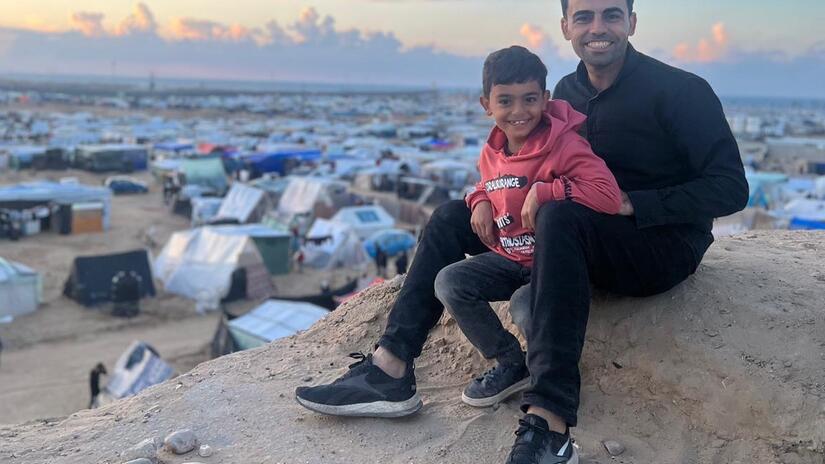The people next door: An ongoing series about people helping others even as they face the very same struggles
Last month we shared the story of Amr Ali, a media officer for the Palestine Red Crescent who like thousands of others in Gaza had to flee their homes due to conflict. In that story, Amr shared his frustrations about wanting to help other people, but not knowing what to tell them.
“They asked me ‘what should we do?” he recalled. “Where should we go and how can we protect our children?’ I couldn’t answer them because I have the same questions.”
Amr had left northern Gaza with his family, temporarily moving to his brother’s house in Khan Yunis. When that city was evacuated, the Palestine Red Crescent lost touch with Amr. With much of Gaza’s infrastructure destroyed, blackouts made communication nearly impossible.
But recently Amr was able to get back in touch and update his colleagues via text messages. Amr had joined thousands of others who moved south to find relative safety in a camp near the border town of Rafah. His journey and life in camp offer a glimpse into the fear, chaos and stuggles facing many thousands of people living in those camps.
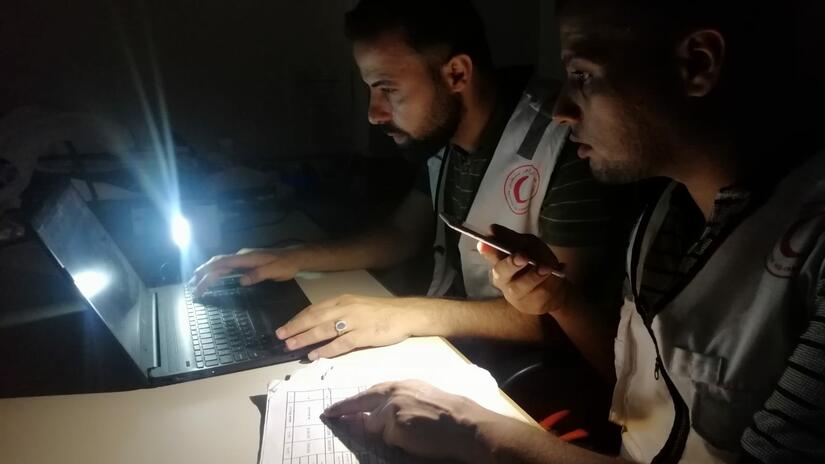
These are the kind of photos Amr used to take as a media officer for the Palestinian Red Crescent, whose volunteers shown here keep working even through constant power outages.
Photo: Amr Ali/Palestine Red Crescent Society
‘The worst time ever’
Knowing they would need to cross a series of check points, Amr and his family left Khan Yunis early in the day on Jan. 27. There was bombing on the way and in the chaos and explosions, Amr was separated from his wife and children: 7-year-old Adam, and 3-year-old Maria.
They couldn’t find each other in the crowds. There was no cell phone, wifi, or other signal.
“This was the worst time ever,” Amr recalls. “For more than 12 hours I had no idea about my wife and my kids. I tried to ask hospitals if they got injured or killed.”
Because the signal is so bad, Amr used friends and relatives in the West Bank as to relay messages. Just after 10 p.m. he got the call. Some relatives had spotted his family, and took them in. Everyone was okay.
“It was very, very unsafe, but we managed to get to Rafah,” Amr said.
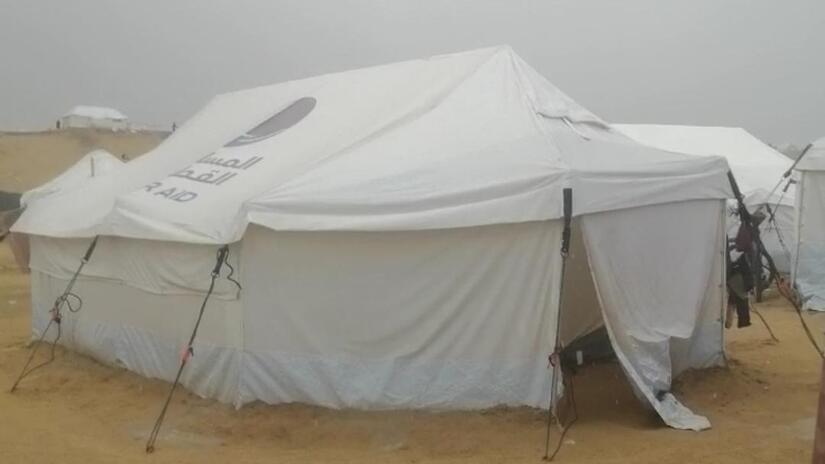
The tent where the family is now living in Rafah, shown here in the midst of a storm of heavy winds and rains.
Photo: Amr Ali/Palestine Red Crescent Society
‘Nothing set up here’
As a media officer, Amr used to take pictures of Palestine Red Crescent staff and volunteers responding to the conflict unfolding around them: dispatch crews working in the dark because lights had gone out, food distributions and ambulance crews returning to the hospital.
Now his photos reflect life in the camp with his son and his daughter, his attempt to keep a smile despite the tragedy and to reclaim some sense of normalcy and hope for his children.
“It’s not easy at all to move from a well-equipped house to a very far place in a tent where is nothing set up.”
Here, he says they make everything by hand, setting up a bathroom, kitchen, places to sleep and a system to store water. Access to food remains difficult, costs have jumped three and four times since the beginning of the conflict.
Meat was $12USD before, now it’s more than $40 — if it’s available at all. Amr says his family cannot afford that, so they eat canned foods.
The sound of bombs
Meanwhile, Amr’s children are struggling. His son Adam lost his friend after an explosion across the street damaged the house he was staying in. Maria is confused as to why they have to keep moving.
Amr says for a short time it was quiet in Rafah.
“For a while we rarely heard the sound of bombs and shelling,” he said.
But that can change in a moment. In February explosions and gunshots were heard across the city.
“Living in a tent in such situations is very terrifying. You feel every bullet is directed to your body. We were terrified and each of us went to check on our children and loved ones. Living all this while in a tent made of fabric makes you feel like the weakest creature on earth.”
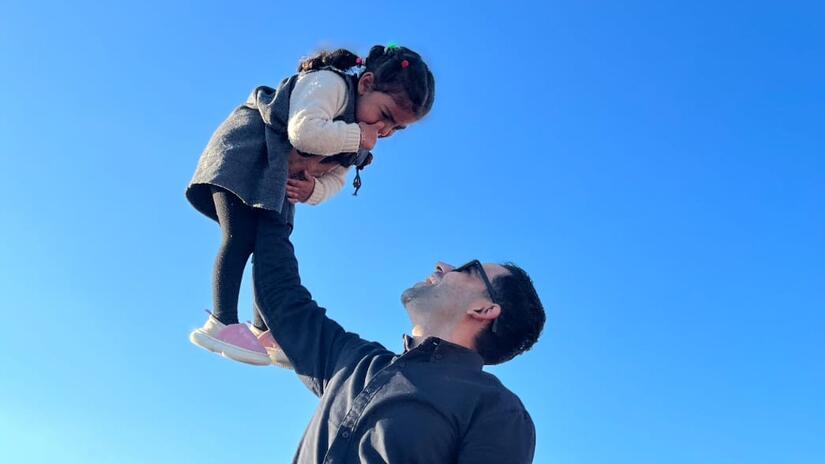
Amr with his daughter, Maria, during an event organized for kids in the camp where they are staying in Rafah.
Photo: Amr Ali/Palestine Red Crescent Society
Mostly, now Amr thinks about the future. “We keep talking about what happened earlier and where will we stay after the conflict ends. I believe that all of us will continue our life in tents and all this will last for a long time, maybe years,” he says.
“I do not want my children to continue dreaming about the scene of soldiers, tanks, shooting and the terrifying sound of bombing.”
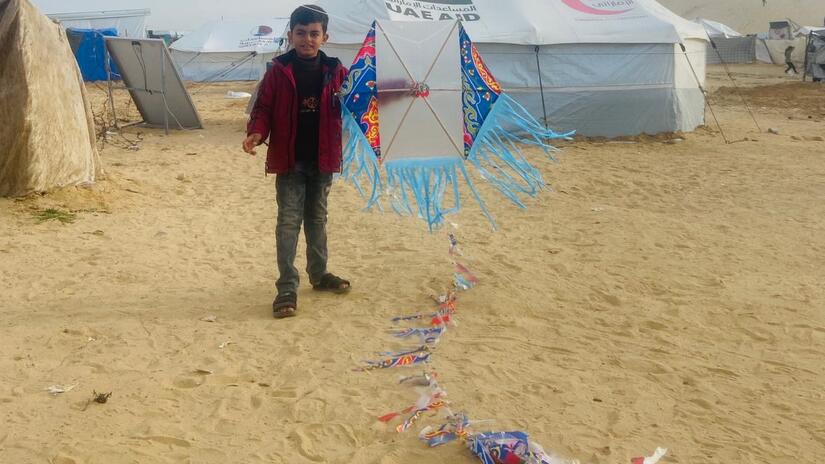
Amr's son Adam flying a kite in the camp where the family lives in Rafah
Photo: Amr Ali/Palestine Red Crescent Society
Meanwhile, the Palestine Red Crescent Society staff and volunteers continue to provide medical care in hospitals and medical posts, ambulance services, public health messaging, and psychosocial support to people in Gaza.
Teams are also coordinating the reception and distribution of life-saving aid, such as food, water, medicine, and other emergency items. They do this despite worrying for the suffering of their families and living in the difficult conditions themselves.

